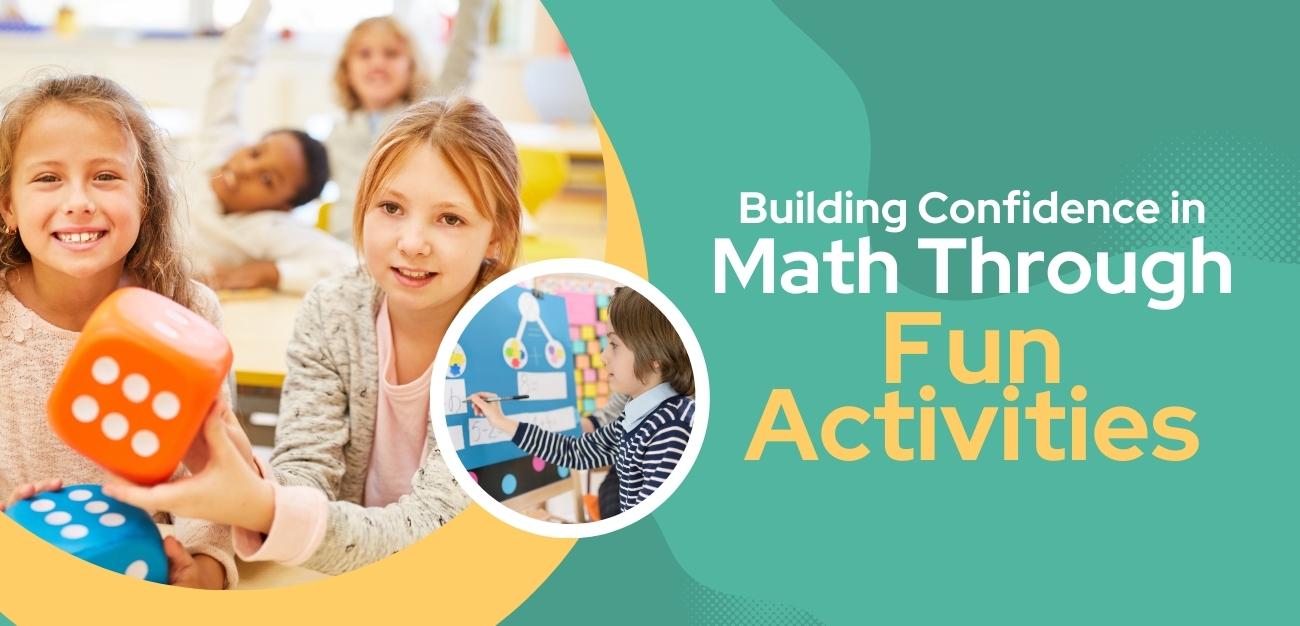Welcome! You’re undoubtedly aware that math can be one of the most challenging subjects for children to grasp. Often, it’s not the subject itself that’s the crux of the problem, but the approach that dulls their interest. What if we told you there’s a different way? A way to build your child’s confidence in math through fun activities. This blog post will guide you through a variety of activities designed specifically to make the learning process exciting and enjoyable for children aged 8 – 14. Let’s inject some fun into math and watch their confidence soar!
“Mathematics is not about numbers, equations, computations, or algorithms: it is about understanding.” – William Paul Thurston, renowned mathematician
Our goal here is to nurture childhood’s innate curiosity, stimulating children’s minds without them feeling overwhelmed or bored. By incorporating enjoyable activities into math practice, we make it less of a ‘chore’ and more of an engaging pastime. So, how can we do this? Here are some key methods, and how to help your child with math at home.
- Math Games: Whether physical or digital games, turning math into a game creates a fun and competitive environment promoting learning.
- Puzzles: Puzzles are a brilliant way to challenge your child’s mind, helping them to think logically and solve mathematical problems creatively.
- Real-life Applications: Understanding the real-world applications of math can spark curiosity and show your child the purpose behind their learning.
Before we delve into the specifics of each activity, let’s first understand why a fun approach to learning math is beneficial for kids.
How Making Math Fun Is Essential For Boosting Children’s Confidence In Math
Ever wondered why your child shies away from Math? The likely culprit is a lack of confidence. Confidence in Math, like any other skill, stems from an understanding and mastery of the subject. This might seem like a daunting task, but remember – every journey starts with a single step! So, how can you take that crucial first step towards fostering confidence in Math? The answer is – make it fun!
When Math is equated with fun, children tend to associate the subject with positivity and excitement, instead of fear or boredom. This fun approach goes a long way in taking the pressure off and making children more receptive to learning. They start to see Math as a puzzle to solve rather than a problem to fear.
Below are some easy and enjoyable activities you can incorporate into your child’s routine to build their confidence in Math.
How To Teach My Child Math: Get The Fun Rolling With Board Games
Math board games are a fantastic, interactive way to make learning math a fun and enjoyable experience for your children. Engaging in these games can stimulate their interest in numbers and mathematical concepts. With gameplay woven around critical thinking and problem-solving, you’ll find your child’s confidence in math gradually increasing.
So, let’s hop right into a few math board games that would keep both you and your kids entertained while learning.
- “Prime Climb”: This award-winning game makes learning about prime numbers, multiplication and division incredibly fun. The colorful board and interesting gameplay keep the kids engaged, while they organically pick up complex concepts.
- “Zeus on the Loose”: A captivating Greek mythology inspired math game that helps kids with number sequencing, addition, and subtraction. Sneakily integrating numbers into the tales of gods and goddesses, this game cleverly disguises the learning aspect in an enjoyable story.
- “Math for Love – Tiny Polka Dot”: This collection of games is targeted towards the younger children, making them comfortably familiar with numbers and basic math operations. It’s a great starting tool for kids just beginning their math journey.
Before heading on this adventure with your kids, don’t be afraid to let them show you the ropes sometimes. Allowing them to lead the game can give a much-needed boost to their confidence, making them feel capable and smart.
And remember, while each game can teach a different mathematical concept, the most important lesson is that math, when made fun, can be understood and enjoyed by all. Don’t pressure them into winning; instead, focus on the learning, the jokes, and the quality time you’re spending together. The confidence and satisfaction derived from this will be priceless for your child.
Puzzling Math: Solve And Learn
There’s something exciting about solving a puzzle—it feels like unlocking a secret or deciphering a code. When math is woven into this process, not only can your child improve their problem-solving skills, but they can also achieve a deeper understanding of mathematical concepts. Let’s plunge into some fascinating math-based puzzles your kids can indulge in.
Firstly, Sudoku is a classic number placement game that requires logical thinking. Sudoku puzzles come in different levels of difficulty which makes it excellent for kids of all ages. It doesn’t just stimulate their brains—it teaches them about number relationships and practicing strategic thinking.
Next on the list is Kakuro—a cross-sums puzzle game. Labelled as the mathematical equivalent of a crossword puzzle, children must add numbers down across and in such a way that they equal the sums given on the puzzle. This game encourages kids to think critically about addition and subtraction.
All-time favourite, Magic Square, is another intriguing math puzzle. The challenge here is to arrange numbers in a square so that the total of numbers in every row, every column, and both diagonals are the same. This delightful puzzle helps children understand the basics of algebra and the concept of balance in equations.
- Sudoku: Improves logical reasoning and understands number relationships
- Kakuro: Encourages critical thinking about addition and subtraction
- Magic Square: Teaches the basics of algebra and balance in equations
Remember, the goal is not necessarily to solve each puzzle quickly but to enjoy the journey of exploration and discovery. You’ll be surprised at how much these fun activities can boost your child’s confidence in math!
Math Magic: Tricks And Puzzles
Ready to add a sprinkle of excitement to your child’s math journey? Nothing makes math more thrilling than combining learning with some mysterious, captivating magic tricks. Here are a few fun math magic tricks and puzzles that you can try out with your kids.
The Prediction Trick
Ask your child to choose any number between 1 and 10. Let them multiply it by two, and then add eight to the result. After that, have them divide this result by two. Now, finally let them subtract the original number they selected initially. The answer will always be four! It’s a great way to experiment with order of operations and make math feel like magic.
The Missing Number Puzzle
Draw a square into nine smaller squares (like a sudoku board) and fill in numbers 1 to 8, leaving one square empty. Ask your child to find the missing number. This helps in enhancing their problem-solving and critical thinking skills.
The Magic Gopher Game
The magic gopher is a fun online game where a gopher predicts the symbol you’re thinking of based on numerical calculations. Use it as a fun, digital way to practice basic arithmetic and develop pattern recognition. However, remember to not rely solely on digital tools. It’s just one of the many resources you can utilize.
Pro tip: Set aside a fixed ‘math magic time’ every week. During this period, treat math like a fun magic show. It not only creates an element of surprise and curiosity but also makes learning an exciting venture for kids.
Indeed, combining magic tricks with math can turn Monday drills into Sunday thrills. So, let’s empower our kids to see the magic that math holds. Remember, a little bit of fun can go a long way in fostering love for learning and building confidence. So, let’s turn those math equations into exciting magic journeys!
The key to building confidence in math is to make it enjoyable and relatable. Active games do this very well, giving kids a chance to engage with the material in a fun, non-threatening way. As they say, ‘Play is our brain’s favourite way of learning.’
So next time your child has math homework, perhaps consider turning it into one of these games. Make mathematics an exciting treasure hunt, not a chore. Remember, it’s not just about the right answer but also about the fun route that got them there!
Developing A Healthy Appreciation For Math
In conclusion, fostering a love for math in your children doesn’t have to be a daunting task. Introducing them to entertaining and educational games can spark their interest and bolster their confidence in handling math problems. Remember, the idea is not just to strengthen their skills but also to make math enjoyable and engaging. Through playful learning, children are more likely to develop a healthy appreciation for math, making them not just better learners, but also future problem solvers and critical thinkers.
For more fun games and ideas on how to build your child’s confidence in mathematics, sign up for our FREE bulletin today!





